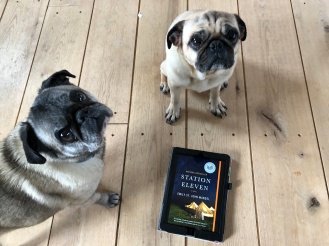 The Hazards of Time Travel
The Hazards of Time Travel
Joyce Carol Oates
Seventeen-year-old Adriane Strohl, a senior at Pennsboro High School (New Jersey) in 2039 has distinguished herself scholastically by excelling in class and asking questions of her teachers. She’s been named valedictorian and received a Patriot Scholarship. The problem: in 2039, being smart and standing out is dangerous. Citizens are surveilled through cell phones, electronic communications, and every day appliances. Anyone might be an informant for Homeland Security. And there is every only one candidate for president, the Patriot Party candidate who has the most money. After all, in the two-party system, the person with the biggest war chest won, so why waste all that money and energy?
At her graduation rehearsal, Adriane is arrested for Treason and Questioning Authority. She is punished with four years of Exile, send back eighty years into the past, to Wainscotia Falls, Wisconsin (or Zone 9), where she becomes “Mary Ellen Enright” a senior at Wainscotia State University. As an outsider and time traveler, she has the perspective to make observations about the culture of mid-twentieth Century America, but she is first astounded at her roommate’s hot rollers and lipstick before she notices the paucity of female students and faculty. Still, 1959 Wisconsin is not too different from 2039 New Jersey, and in fact, it might be the model for the future so an ideal setting for Adriane to become reeducated.
Adriane must follow the Instructions: never reveal her status as an Exiled Individual, never reveal the future, never procreate, never move beyond a ten mile radius from her epicenter. Disobeying the Instructions results in immediate Deletion. Adriane is so desperate to follow the rules, she withdraws and hardly talks or makes eye contact with others. She imagines informants at every turn. Yet, she’s also despondent and lonely, and desperate to remember her family which she cannot do clearly because of a microchip the authorities implanted in her brain.
In her despair, she fixates on Dr. Ira Wolfman, her Introduction to Psychology discussion section instructor who she believes is another Exiled Individual. Her obsession with him is uncomfortable and verges into stalker territory, and I found the writing surrounding her love for him maudlin and overwrought. While it might have been appropriate for a love-sick teenager, it wasn’t at all pleasant to read.
In fact, much of the book, to me, was a slog, with a stilted writing style that I don’t associate with Joyce Carol Oates. There are too many parentheticals and hyphenated asides. Although the world of 2039 was built mainly through a litany of departmental names, I wish more than a few chapters of the novel had been set there. I had to force myself to continue even after a surprising zing in the narrative. And, for all that, the ending was confusing and unsatisfying.
The Hazards of Time Travel had some interesting elements, though. One fun aspect was the reverence at the university for professors doing research (e.g., disproving the theory of relativity) that would clearly be discredited. In the guise of Dr. Axel, the Intro to Psychology professor and an avowed behaviorist, Oates infuses the book with references to Skinner and people as a system of responses to stimuli versus people with selves.
Adriane, living in Wainscotia as Mary Ellen, doesn’t feel she can genuinely respond to her roommates because they know her as Mary Ellen and she is not Mary Ellen. Perhaps this is why the thought Dr. Wolfman might be a fellow Exiled Individual is so alluring.
Adriane, and other characters who survive and thrive, seem to have adopted a philosophy of living in the moment: “You can live a life even if it is not the life you would have chosen. You can live breath by breath. You can live.” Yet, this same philosophy is criticized as it has been used by the government: “America is founded upon amnesia—denial. Conscience cannot keep up with acts.” For individuals, then, the hazards of time travel are grief and despair, a sense of being displaced, so that living moment by moment is necessary. Polities, though, don’t have the luxury of such an attitude. Without being steeped in history, 2039 won’t be much different that 1959.
 I read The Last One by Alexandra Olivia about two years ago, and I still think about it, so it seemed a perfect book to share for #throwbookthursday.
I read The Last One by Alexandra Olivia about two years ago, and I still think about it, so it seemed a perfect book to share for #throwbookthursday. Empty Hearts
Empty Hearts Plague Land: No Escape
Plague Land: No Escape Station Eleven
Station Eleven The Hazards of Time Travel
The Hazards of Time Travel